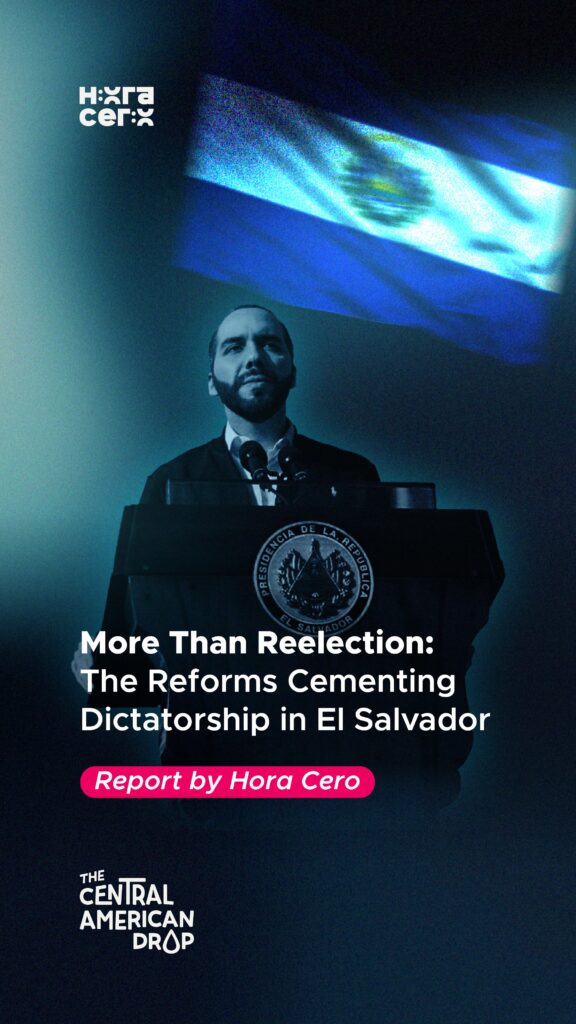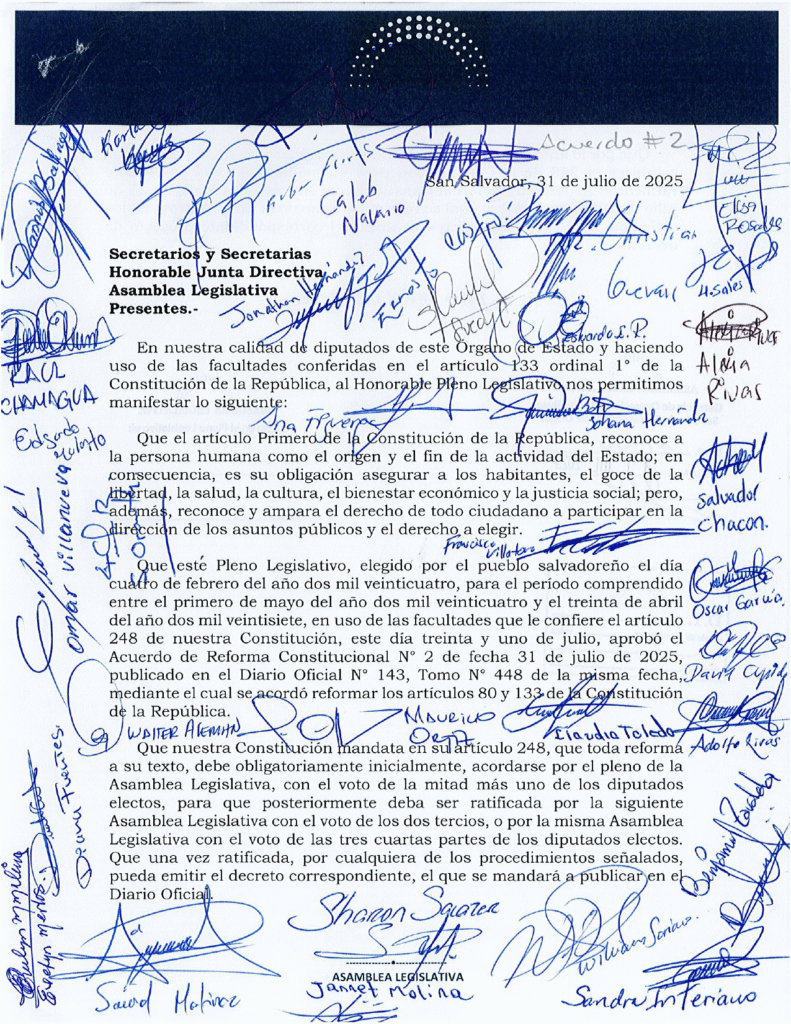
On July 31, 2025, the Legislative Assembly of El Salvador dealt another blow to the country’s democracy. Without discussion by the 60 deputies, with no formalities required, and holding two plenary sessions in a single night, a constitutional reform was approved, allowing indefinite reelection. These reforms would also extend the presidential term to six years, eliminate the second round of voting, and unify the electoral calendar so that the elections for deputies and mayors can be held in the same year.
The reform covers Articles 75, 80, 152, and 154, which refer to the loss of rights for those seeking immediate reelection, the criteria that define the majority required to determine a president-elect, and the length of the presidential term.
Article 75 eliminates the grounds for losing citizenship for those seeking reelection, while allowing public officials, including representatives, to seek reelection or continuation of the presidency without penalty. Article 80 modified the presidential election mechanism, allowing the winner to be chosen «by simple majority» and annulling any runoff elections. These reforms, according to a Legal analysis of these reforms published by Cristosal, facilitate a victory with low popular support and reduce the filters of democratic legitimacy.
Furthermore, the previous restrictions prohibiting immediate and indefinite reelection, as set out in Article 152, are being dismantled. Now, the head of the Executive branch may seek office as many times as they wish, eliminating alternation as a constitutional principle.
Furthermore, this reform decree approved a transitional provision that sets the end of the current presidential term in 2027, rather than 2029 as planned, with the aim of «unifying the elections for President and Vice President of the Republic, Deputies to the Legislative Assembly, and Municipal Councils, which are to be held in that year.»
Articles 80 and 133 were also amended to remove El Salvador from the Central American Parliament. The ruling party justified this withdrawal because they believe PARLACEN has been an «institution marked by harboring corruption,» according to the president of the Assembly, Ernesto Castro, in his social media account on X.


Previously, in January of this year, the Assembly had already paved the way for this package of reforms, amending Article 248 of the Constitution, which allows a single legislature to approve and ratify reforms. Thus, the rule establishing that a reform to the Magna Carta had to be approved in one legislature and ratified in the next, was eliminated.
Article 248, in its previous version, strictly prohibited reforming sections on «the form and system of government,» «the territory,» and «alternation in the exercise of the presidency of the Republic.» This prohibition extended to Articles 75, 87, 88, 131, 151, and 154, rendering immediate and indefinite reelection unconstitutional, according to Cristosal jurists.
Both Cristosal’s analysis and the opinions of various lawyers, experts, and international organizations recalled that the Inter-American Court of Human Rights, in its advisory opinion OC-28/21, declared that enabling indefinite presidential reelection is contrary to the principles of representative democracy and the international human rights treaties to which El Salvador has signed. Promoting such a reform not only contravenes international obligations but also equates the country with openly authoritarian regimes on the continent, bringing significant diplomatic discredit.
The Inter-American Court warns that, currently, the greatest danger facing democracies is not coups d’état, but rather the gradual, legal erosion of the checks and balances that allow elected leaders to impose authoritarian models on the state.
For Cristosal, some of the negative effects of this reform package, which has been described as a «coup de grace» for Salvadoran democracy, include an increase in human rights violations, rising corruption, political persecution, and the closure of public spaces, all while impacting the economy and investment.
The organization warns that the reforms contravene the obligations assumed with the International Monetary Fund, especially those related to Governance and Transparency.

| Cookie | Duración | Descripción |
|---|---|---|
| cookielawinfo-checkbox-analytics | 11 months | This cookie is set by GDPR Cookie Consent plugin. The cookie is used to store the user consent for the cookies in the category "Analytics". |
| cookielawinfo-checkbox-functional | 11 months | The cookie is set by GDPR cookie consent to record the user consent for the cookies in the category "Functional". |
| cookielawinfo-checkbox-necessary | 11 months | This cookie is set by GDPR Cookie Consent plugin. The cookies is used to store the user consent for the cookies in the category "Necessary". |
| cookielawinfo-checkbox-others | 11 months | This cookie is set by GDPR Cookie Consent plugin. The cookie is used to store the user consent for the cookies in the category "Other. |
| cookielawinfo-checkbox-performance | 11 months | This cookie is set by GDPR Cookie Consent plugin. The cookie is used to store the user consent for the cookies in the category "Performance". |
| viewed_cookie_policy | 11 months | The cookie is set by the GDPR Cookie Consent plugin and is used to store whether or not user has consented to the use of cookies. It does not store any personal data. |